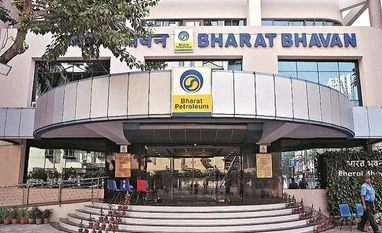Notwithstanding the disruption to businesses caused by the second wave of COVID-19, the government is aiming to conclude privatisation of PSUs like Air India, BPCL and Shipping Corporation - where the divestment process has already started - this fiscal, sources said on Wednesday.
The worst outbreak of pandemic in the country has led to disrupting the timetable of scheduled activities such as physical due diligence because of travel restrictions.
But the process is likely to get back on track from September, the sources with the direct knowledge of the government's privatisation plans said.
The process of privatisation of Air India, BPCL, Pawan Hans, BEML, Shipping Corp and NINL has already moved to the second stage after the government received multiple expressions of interest (EoI) for these CPSEs.
The Budget for 2021-22 has set a disinvestment target of Rs 1.75 lakh crore, higher than Rs 32,835 crore garnered in the last fiscal. Of the Rs 1.75 lakh crore, Rs 1 lakh crore is to come from selling government stake in public sector banks and financial institutions. Rs 75,000 crore would come as CPSE disinvestment receipts.
In her Budget speech, Finance Minister Nirmala Sitharaman said strategic disinvestment of BPCL, Air India, Shipping Corporation of India, Container Corporation of India, IDBI Bank, BEML, Pawan Hans, Neelachal Ispat Nigam Ltd, among others, and IPO of LIC would be completed in 2021-22.
The process of privatisation of Air India, BPCL, Pawan Hans, BEML, Shipping Corp (SCI), Neelachal Ispat Nigam Ltd, and Ferro Scrap Nigam Ltd (FSNL) is ongoing.
Also Read
The sources said privatisation of these PSUs will be completed this fiscal ending March 2022.
They said Air India privatisation is on track despite Cairn Energy's lawsuit to get Air India recognised as the alter ego of India and that "it should be held jointly and severally responsible for India's debts, including from any judgment resulting from recognition of the award".
Once a court recognises Air India as the alter ego of the Indian government, Cairn can seek attachment or seizure of its assets in the US such as airplanes, immovable assets and bank accounts to recover the amount it was awarded by the arbitration tribunal.
"India is defending itself in the tax case. The Air India privatisation is on track and will not be impacted," a source said.
Air India, which was earlier this week served the lawsuit filed by Cairn in a New York court, will challenge it being made liable for the discharge of any payment obligations of the Government of India.
Even if Cairn succeeds in getting Air India recognised as alter ego of the government, it would not mean that the airline's assets will fall into the hands of the British firm, the sources said.
All it means is that Cairn can seek the seizure of any asset Air India may have in the US. There may not be many such assets.
The only threat there could be that when an Air India airplane lands at any US airport, Cairn is able to move court and get that attached before it flies out, they said.
The international arbitration tribunal had in December last year overturned the Indian government's Rs 10,247 crore tax demand from Cairn and ordered New Delhi to return the value of shares it had sold, dividends seized and tax refunds withheld.
Salt-to-software conglomerate Tata Group was among the "multiple" entities that had put in preliminary bids for buying loss-making Air India in December last year.
For BPCL privatisation, mining-to-oil conglomerate Vedanta had put in an expression of interest (EoI) for buying the government's 52.98 per cent stake in the PSU. The other two bidders are said to be global funds, one of them being Apollo Global Management.
(Only the headline and picture of this report may have been reworked by the Business Standard staff; the rest of the content is auto-generated from a syndicated feed.)
)